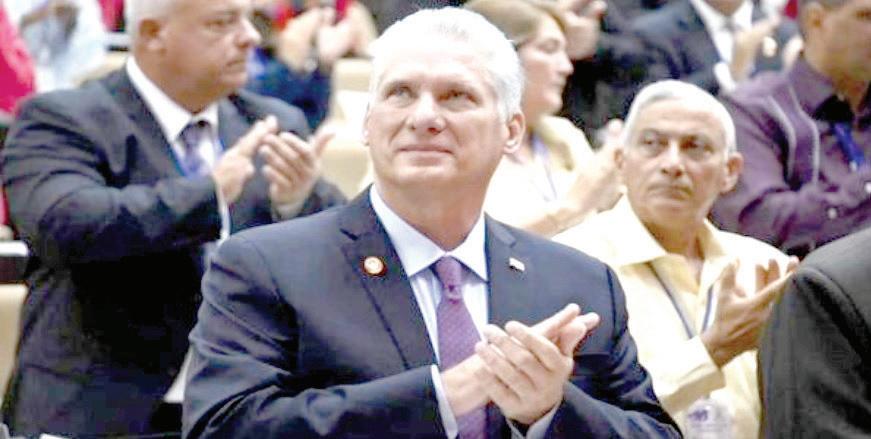
2 minute read
Cuba’s Parliament ratifies President DíazCanel for new term Caricom Heads agree to ban assault weapons
Caricom leaders are moving to ban the public’s use of assault weapons and have also promised to write to the US Government to demand a stronger effort to prevent the flow of guns into the Region and to stand with Caricom the same way Caricom stood by the US in their war on drugs.
weapons from civilian populations, Prime Minister Rowley explained that over the years these weapons have slowly been licensed to the civilian population.
port them as well with the legislation moving forward.
Cuba’s National Assembly ratified President Miguel Díaz-Canel Bermudez on Wednesday for a new fiveyear term.
On Wednesday, the deputies of the newly-constituted National Assembly of People’s Power (ANPP) in its 10th Legislature re-elected Díaz-Canel as President of the Republic of Cuba.
The President of the National Electoral Council, Alina Balseiro, said that 97.66 per cent of the total number of deputies
(462) voted for Díaz-Canel’s re-election, so he received the support of the absolute majority.
Salvador Antonio Valdés Mesa was ratified as Vice President of the Republic by 93.4 per cent of the total number of deputies of the National Assembly. At the proposal of the re-elected President, the deputies approved by absolute majority to ratify Deputy Manuel Marrero Cruz as Prime Minister. Díaz-Canel recognised that Marrero “has developed a style of work marked by interaction with the people and direct attention to the attention of social policies, including work in the neighbourhoods”.
More than 400 representatives to the assembly who were ratified by voters in March took office early Wednesday and then convened the chamber to elect the Government’s leadership and the President. Díaz-Canel obtained the votes of 459 of the 462 legislators present.
(Excerpt from Telesur English)
Biden to discuss Venezuela sanctions with Colombia’s Petro in White House talks – official
US President Joe Biden will tell Colombian President Gustavo Petro in White House talks today that he is willing to further ease sanctions on Venezuela only in return for concrete steps toward free elections there, a senior Administration official told Reuters.
Previewing the leaders’ first meeting, the official said Biden would reiterate to Petro, who has called for lifting sanctions on Venezuela, that he is not prepared to provide significant sanctions relief to President Nicolás Maduro’s Government until he agrees to democratic steps with the country’s Opposition.
Relations between neighbours Colombia and Venezuela have warmed since Petro’s inauguration in August, and Maduro has celebrated moves by Bogota to organise an international conference on April 25 to promote resumption of talks between his Socialist Government and Opposition politicians.
The White House talks are aimed at renewing historically strong ties between Washington and Bogota and charting a new relationship with Colombia’s first leftist President. A wide-ranging agenda will also include anti-drug cooperation, regional migration, Petro’s peace efforts with rebel groups as well as climate change.
Since taking office, Biden has eased some US sanctions on Venezuela to encourage dialogue. But negotiations have stalled again.
“Unilateral lifting of sanctions,” the official said on condition of anonymity, “will line the pockets of people who have already stolen billions of dollars from Venezuela ... The two Presidents are going to likely discuss it and I think we can find common ground.”
(Excerpt from Reuters)









